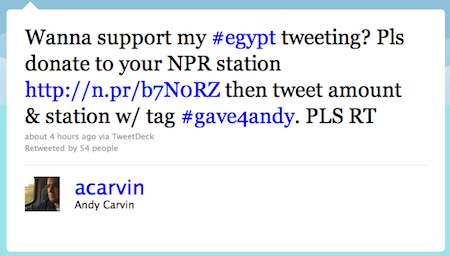
One of the winners of the January 25 uprisings in Egypt — besides, of course, the people of Egypt — has been Andy Carvin. NPR’s social media guru has been doing an exemplary job of curating social media to report on a weeks-long protest that seems to have transformed, today, into a democratic revolution.
Carvin’s work cultivating sources and sharing their updates has turned curation into an art form, and it’s provided a hint of what news can look like in an increasingly networked media environment. “It really has stood out as an alternative model of news,” says Kinsey Wilson, NPR’s senior vice president and general manager of digital media. It’s also led to earnest talk of a Pulitzer for social media curation (with Carvin, of course, as the prize’s first recipient) and to equally earnest discussions, among Jeff Jarvis and others, of how to translate Carvin’s curatorial prowess into a full-fledged business model.
 It’s also led, Wilson told me, to more immediate questions of financial support among those who’ve been following, and benefiting from, Carvin’s coverage. How, they want to know, can they donate to it?
It’s also led, Wilson told me, to more immediate questions of financial support among those who’ve been following, and benefiting from, Carvin’s coverage. How, they want to know, can they donate to it?
A few hours ago, Carvin hacked together an ad hoc response to that question. He sent out a non-news tweet to his Twitter stream: “Wanna support my #egypt tweeting? Pls donate to your NPR station http://n.pr/b7N0RZ then tweet amount & station w/ tag #gave4andy. PLS RT”
The tweet, so far, has been retweeted directly by 54 people. And, more to the point, it’s been responded to with actual donations to NPR stations. (NPR doesn’t take money directly through its listeners, but rather through its member stations.) So far, the on-the-fly pledge drive has raised over $2,000, by my rough count — $2,215, to be precise — for member stations both big (WNYC, WBUR) and small (WOUB from Athens, Ohio).
I should stress, of course, that the donation stats aren’t based on official, station-based pledge data. The info is cobbled together from the hashtag stream itself — by me, no less, not anything reliably automated — and, furthermore, it’s based on self-reported donation amounts and self-reported donation recipients. Some people who tweeted to the #gave4andy tag have indicated that they’ve donated, but haven’t included the amounts they’ve pledged (and so aren’t included in the total amount). Others have mentioned vague donation amounts — “monthly installments” and the like — and so, similarly, aren’t counted in the total. Still others may well have made donations without noting that they’ve done so on Twitter (or within the #gave4andy hashtag stream). So: Huge grain of salt.
Still, though, the tweet, the tag, and the response combine to form an intriguing example of what can happen when you harness the power of a particular event, and a particular moment — and translate that energy to financial support. People, as the tweets flooding Twitter and the updates flooding Facebook can attest, love to feel that they’re part of something — particularly when that something is the making of history. Contributing financially to the reporting of human events can be a small, but quite meaningful, way to be part of them.
The carpe hashtag approach is also an indication of what can come when news organizations give their individual staffers the power to experiment — even when it comes to the business side of the news. “This was spontaneous on his part — he did it on his own initiative,” Wilson notes of Carvin’s tweet. (Carvin himself, by the way, is still tweeting up a storm — and after that, we hope, will be #giving4andy some well-deserved downtime.)
Not only was Carvin’s seize-the-moment spontaneity not a rogue move; on the contrary, Wilson says, “it’s exactly the kind of initiative that we try to encourage people to take — to be nimble and smart and take what I’d classify as ‘prudent risks.'”
That’s significant, because Carvin’s curation could easily be a matter of tension. Carvin works closely with NPR’s news team, Wilson notes, and “there’s a lot of communication back and forth”; still, the work he’s been doing — with Egypt, and before that with Tunisia, and before that with Iran, etc. — has largely been done under the auspices of his personal Twitter account. To the extent that, when people think of “that awesomely curated Egypt stream,” they usually associate it with @acarvin, rather than @NPR or @NPRNews.
The hashtagged pledge drive, though, offers a kind of reconciliation for that personal/organizational disconnect: It’s a way to ensure that the exemplary work of an individual employee accrues, financially, to the employee’s organization. It’s also, more broadly, a way to ensure that the work Carvin — and, by extension, NPR — is investing in generates reward beyond Twitterspheric plaudits. One of the questions NPR asks itself, Wilson notes, is what becomes of public radio’s traditional means of financial solicitation — the pledge drive — in a new and constantly shifting media landscape. With the ad hoc hashtag, “we may have stumbled onto a useful way” to think about the pledge, he says. It’s way too early to come to any concrete conclusions about event-specific solicitations, of course. Still, though: “There may be a kernel in this.”